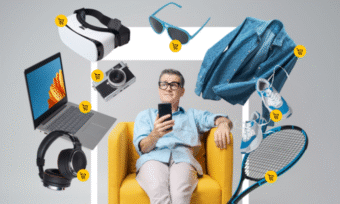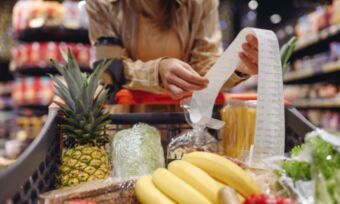How to overcome a shopping addiction

Behavioural economist and psychologist Phil Slade looks at some of the reasons people get addicted to shopping and shares his tips on what you can do if you think you have a problem.
The term ‘shopaholic’ often gets trivialised. It is sometimes used as a light-hearted explanation to friends when they see a lot of shoes or clothes in your wardrobe. The problem with this light-hearted approach is that it can act as a bit of a smokescreen to what is actually a very serious issue that research suggests directly impacts up to 15% of us.
Shopaholics – that is, people addicted to shopping – come in all shapes and sizes, including:
- Compulsive (escaping temporary emotional distress)
- Trophy Gatherers (always looking for the best thing)
- Blingy and Over-generous (want to be seen as rich)
- Bargain Hunters (can’t walk past a bargain, even if they don’t need or want it)
- Big Returners (addicted to buying and returning)
- Collectors (they simply must have the whole set)
Add to this the current COVID-19 economic climate where we’re all being encouraged to spend a little in order to keep the economy ticking over, and the idea of talking about overindulging at the check-out in order to feel good about yourself becomes an even trickier thing to discuss. So, let’s for a moment talk about an ‘ism’ that is a bit easier to discuss as an analogy – alcoholism.
When we talk about alcoholism, we know that we’re not saying that alcohol is evil, just the reliance on alcohol as a crutch to feel good or satisfy an overwhelming urge. For most alcoholics drinking alcohol is just their brain’s maladaptive way of coping with something traumatic or stressful, to relieve pain, when they haven’t learned other more emotionally resilient ways to deal with it. They get relief with alcohol, then in the absence of alcohol the pain returns, so they are driven back to alcohol to stave off further pain.
Many of us know this on some level – it’s why we might jump for a drink at the start of any awkward social situation such as a networking event, a date, or even some family gatherings. We just need something to lower the stress. However, when we rely too much on alcohol as temporary stress relief, then things can start to get ugly.
Why people get addicted to shopping
The pathway to becoming a shopaholic is no different. You might shop for extra clothes because of a deep fear that you won’t look good in some future scenario and be rejected by others. You may shop because you feel powerless in your life and the act of purchasing something is at least a decision you can make and provides some semblance of control. You may shop because deep down you think you’re ugly or not valued, and so you think keeping up with the height of fashion helps distract people from the real you. You may just want to be accepted by the ‘cool’ group.
This is the pathway to addiction to any external stimulus, of which shopping is just one. It makes us feel good because when we do it our brain releases dopamine and endorphins, which are our internal feel-good drugs.
The important thing to note is that our attraction to things we can get addicted to is often our body’s way of trying to survive, to relieve the pain of a stressor our psyche determines is threatening in some way. It’s important to understand this so we stop beating ourselves up about it. However, in a strange twist of irony, the very thing we turn to in order to survive can become the very thing that hurts us, our key relationships and our legacy.
It all starts with an underlying trauma or ‘stressor’ as we psychologists like to call it. Why did you turn to alcohol/shopping/drugs/exercise in the first place? What was the underlying pain that you were subconsciously trying to solve?
It is important to recognise the underlying driver, otherwise getting off the addiction to one thing will likely only be replaced with addiction to something else. Remember, if you are no longer in control of the thing that is helping you, it is probably harming you, your relationships, or your future. And don’t lie to yourself – you know when you’re not in control, even if you protest to others about how in control you are. It just takes a lot of bravery to stop lying to yourself.
The two important realisations that can help
In my experience talking with and counselling people from many different backgrounds, almost all addiction is driven by some sense of self-loathing. I don’t like myself, I feel bad about myself, so I do things that make me hate myself less in the moment, and then regret it later and hate myself more, which then drives me to do it again to alleviate the self-hate. It’s a vicious cycle. But it can often be resolved by two key realisations.
The first is that you are not a mistake. You are lovable. You are competent. Your friends like you for the person you are, not for what you do or the way you present yourself. You, at your deepest core, are okay. No matter what you look like, what your skills or talents are, how much money you make, or how funny you are – people like you. You have a beauty inside you that is attractive to others, that is interesting, and which people want to be connected to. This is true of every human on the planet. If you don’t believe it, you are lying to yourself. Understanding this is key to breaking any addiction or staving off people on the pathway to addiction.
The second is realising how much your addiction is hurting those around you – your partner, your children, your friends, your parents, your colleagues. These are all people who want to love you, they all want to be liked by you and to be connected to you. Hurting them just hurts you.
When you have an addiction, you often start to hide your behaviour from the people who love you to avoid judgement and ostracism. This leads to a gap between the person you present to the world, and the person you really are. The greater this gap, the greater the fear of your real self being exposed becomes and the more likely you are to go to extreme measures to protect yourself from exposure.
In extreme cases – particularly in cases of shopping or gambling addiction where large amounts of money are involved – people create very complex systems to hide their spending from their significant others. When the problem gets too big, and the debt or spending becomes too sizable to hide anymore, people may resort to extreme self-harm to escape the overwhelming fear of judgement, disappointment and rejection.
The lie here is that the world is better off without you. This is a lie. Yes, there may be disappointment and hurt from those you love when you become transparent, but it is worth it in the long run. The sooner you become transparent about the issue, the sooner people who care for you can help, and the sooner you will get your life back on track. It’s better to disrupt your relationships now with honesty and humility, than waiting for the lie to inevitably unravel.
The signs that you may be addicted to shopping
Now, don’t worry if you’re like a lot of people who just like the experience of shopping – there is nothing wrong with that. Exploring new things and buying products makes most people feel good. For some people, it’s a social outing that helps build relationships and have a bit of fun.
However, if your spending outstrips your earning (so you are constantly using debt or buy now pay later services to buy things) or your purchasing habits are significantly impairing your ability to save, then you may have a spending problem.
Tips to help you overcome a shopping addiction
Below are my four big tips to caging the spending monster and getting your life back on track after you realise you may have an issue.
- Cut up your credit cards and get rid of any buy now pay later scheme or product that lets you purchase on debt.
- Create resistance. Have two banks that you set up accounts with. The first is the bank you get paid into which also is the one that handles all the utility bills, debt payments and subscriptions that you can set up as direct debits, as well as a savings sub-account. Don’t carry that EFTPOS card and don’t set up access on your phone. The second bank has your spending money in it. When you get paid into the first account, you set up an automatic transfer which you budget for spending on eating out and other more sporadic purchases. This is a forced budgeting habit. If you restrict access to your money, you’ll be less likely to spend it in the heat of the moment and return to bad habits.
- Have an accountability partner. Choose someone you trust and meet with them weekly to report on how you are going. This works best if you are both holding each other to account for something, so you have a shared responsibility to each other.
- Examine yourself. Spend time thinking through the reasons why you might be a compulsive shopper – what problem is your brain subconsciously trying to solve? What are you so afraid of? What is the pain or stress that is driving this behaviour? Make sure you can identify and articulate this. Make the implicit explicit and work at dealing with these things head on, rather than suppressing or escaping them. Remember, you’re actually a likeable human – any other narrative is a lie.
If you are struggling, there are a lot of good support partners out there which you can find online. Lifeline has some great services as does Smart Recovery Australia. Here you will find caring people who are there to help, not to judge.
→ Related: How financial counsellors can help Australians in difficulty
Cover image source: trattieritratti/Shutterstock.com
 About Phil Slade
About Phil Slade
Phil Slade is a behavioural economist, psychologist and co-founder of Decida. Phil has worked with Westpac, Domino’s and Suncorp on developing improved self-awareness and reactivity, and practically applying behavioural economics. His first book Going ApeS#!t is a guide to controlling your inner Ape and making better decisions in all aspects of your life.
This article was reviewed by our Editorial Campaigns Manager Maria Bekiaris before it was updated, as part of our fact-checking process.






